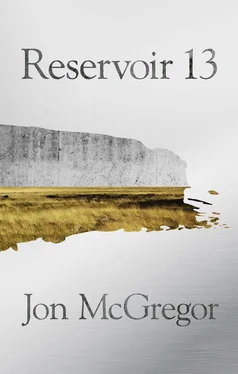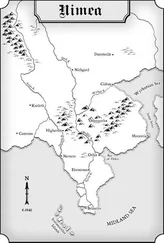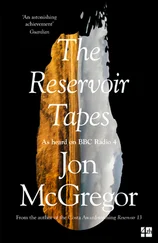Reservoir 13
Jon McGregor

The river is moving.
The blackbird must be flying.
— Wallace Stevens

i. m.
Alistair McGregor
1945–2015
They gathered at the car park in the hour before dawn and waited to be told what to do. It was cold and there was little conversation. There were questions that weren’t being asked. The missing girl’s name was Rebecca Shaw. When last seen she’d been wearing a white hooded top. A mist hung low across the moor and the ground was frozen hard. They were given instructions and then they moved off, their boots crunching on the stiffened ground and their tracks fading behind them as the heather sprang back into shape. She was five feet tall, with dark-blonde hair. She had been missing for hours. They kept their eyes down and they didn’t speak and they wondered what they might find. The only sounds were footsteps and dogs barking along the road and faintly a helicopter from the reservoirs. The helicopter had been out all night and found nothing, its searchlight skimming across the heather and surging brown streams. Jackson’s sheep had taken the fear and scattered through a broken gate, and he’d been up all hours bringing them back. The mountain-rescue teams and the cave teams and the police had found nothing, and at midnight a search had been called. It hadn’t taken much to raise the volunteers. Half the village was out already, talking about what could have happened. This was no time of year to have gone up on the hill, it was said. Some of the people who come this way don’t know how sharply the weather can turn. How quickly darkness falls. Some of them don’t seem to know there are places a mobile phone won’t work. The girl’s family had come up for the New Year, and were staying in one of the barn conversions at the Hunter place. They’d come running into the village at dusk, shouting. It was a cold night to have been out on the hill. She’s likely just hiding, people said. She’ll be down in a clough. Turned her ankle. She’ll be aiming to give her parents a fright. There was a lot of this. People just wanted to open their mouths and talk, and they didn’t much mind what came out. By first light the mist had cleared. From the top of the moor when people turned they could see the village: the beech wood and the allotments, the church tower and the cricket ground, the river and the quarry and the cement works by the main road into town. There was plenty of ground to cover, and so many places she could be. They moved on. There was an occasional flash of light from the traffic on the motorway, just visible along the horizon. The reservoirs were a flat metallic grey. A thick band of rain was coming in. The ground was softer now, the oily brown water seeping up around their boots. A news helicopter flew low along the line of volunteers. It was a job not to look up and wave. Later the police held a press conference in the Gladstone, but they had nothing to announce beyond what was already known. The missing girl’s name was Rebecca Shaw. She was thirteen years old. When last seen she’d been wearing a white hooded top with a navy-blue body-warmer, black jeans, and canvas shoes. She was five feet tall, with straight, dark-blonde, shoulder-length hair. Members of the public were urged to contact the police if they saw anyone fitting the description. The search would resume when the weather allowed. In the evening over the square there was a glow of television lights and smoke rising from generators and raised voices coming from the yard behind the pub. Doubts were beginning to emerge.
At midnight when the year turned there were fireworks going up from the towns beyond the valley but they were too far off for the sound to carry and no one came out to watch. The dance at the village hall was cancelled, and although the Gladstone was full there was no mood for celebration. Tony closed the bar at half past the hour and everyone made their way home. Only the police stayed out in the streets, gathered around their vans or heading back into the hills. In the morning the rain started up once again. Water coursed from the swollen peat beds quickly through the cloughs and down the stepped paths which fell from the edge of the moor. The river thickened with silt from the hills and plumed across the weirs. On the moor there were flags marking where the parents said they’d walked. The flags furled and snapped in the wind. At the visitor centre television trucks filled the car park and journalists started to gather. In the village hall the trestle tables were laid with green cups and saucers, the urns rising to the boil and the smell of bacon cobs drifting out into the rain. At the Hunter place there were voices coming from the barn conversion where the parents were staying, loud enough that the policeman outside could hear. Jess Hunter came over from the main house with a mug of tea. A helicopter flew in from the reservoirs, banking slowly along the river and passing over the weir and the quarry and the woods. The divers were going through the river again. A group of journalists waited for the shot, standing behind a cordon by the packhorse bridge, cameras aimed at the empty stretch of water, the breath clouding over their heads. In the lower field two of Jackson’s boys were kneeling beside a fallen ewe. There was a racket of camera shutters as the first diver appeared, the wetsuited head sleek and slow through the water. A second diver came round the bend, and a third. They took turns ducking through the arch in the bridge and then they were out of sight. The camera crews jerked their cameras from the tripods and began folding everything away. One of the Jackson boys bucked a quad bike across the field and told the journalists to move. The river ran empty and quick. The cement works was shut down to allow for a search. In a week the first snowdrops emerged along the verges past the cricket ground, while it seemed winter yet had a way to go. At the school in the staffroom the teachers kept their coats on and waited. Everything that might be said seemed like the wrong thing to say. The heating pipes made a rattling noise that most of them were used to and the mood in the room unstiffened. Miss Dale asked Ms French if her mother was any better, and Ms French outlined the ways in which she was not. There was a silence again in the room and the tapping of the radiator. Mrs Simpson came in and thanked them for the early start. They all said of course it wasn’t a problem. Under the circumstances. Mrs Simpson said the plan was to follow their lessons as normal but be ready to talk about the situation if the children asked. Which it seemed likely they would. There was a knock at the door and Jones the caretaker stepped in to say the heating would be working soon. Mrs Simpson asked him to make sure the yard was gritted. He gave her a look which suggested there’d been no need to ask. When the children were brought to school Mrs Simpson stood at the gate to welcome them. The parents lingered once the children had gone inside, watching the doors being locked. Some of them looked as though they could stand there all day. At the bus stop the older children waited for the bus to the secondary school in town. They were teenagers now. It was the first day back but they weren’t saying much. It was cold and they had hoods pulled tightly over their heads. All day they would be asked about the missing girl, as if they knew anything more than they’d heard on the news. Lynsey Smith said it was a safe bet Ms Bowman would ask if they needed to chat. She did finger-quotes around the word
Читать дальше
Конец ознакомительного отрывка
Купить книгу














